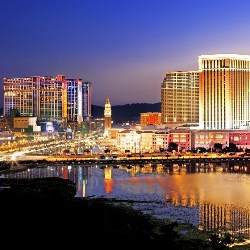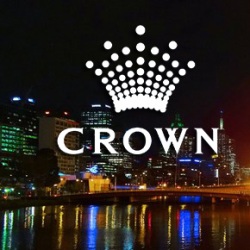Cotai Strip to Become Macau’s Casino Hub

While the Macau Peninsula is the biggest casino resort in the world, one area of the island is fast becoming its main hub of activity, namely Cotai, whose large-scale resorts are expected to change its gaming industry in a way not unlike what has happened in Las Vegas where the city’s traditional gambling district eventually became overshadowed by the Strip.
Macau Peninsula versus Downtown Vegas
Downtown Las Vegas eventually turned into a second tier gaming destination which seemed to attract those people looking for better odds gambling, while enjoying low-priced food and accommodations. This ultimately prevented owners of downtown locations from reinvesting in their properties, and it is said that the Macau Peninsula could very well end up this way, and lose its market to the more enticing properties and five-star hotels available on Cotai.
The transformation of Cotai, however, does not mean that the rest of Macau’s properties will go out of business, as most of the casinos on the Macau Peninsula are going to survive, and will always have the advantage of having casinos that are easy to navigate, and gain easy admittance. A few of these properties might end up being be sold, though, and inevitably fall by the wayside a bit relative to the casinos situated on Cotai.
Advantages of Cotai
It is said that those casinos and resorts on Cotai boast two main advantages for the casino operators: new attractions to excite customers, and an increase in overall gaming table inventory. The properties that are opened on Cotai have all increased the number of slots and tables that have opened in the past 18 months, and this has attracted gamers from the Macau Peninsula, as well as tourists that come from the Great Pearl River Delta who want to see the multi billion dollar themed casinos and resorts.
There are a few people that are more optimistic about the fate of the Macau Peninsula, though, and are not expecting the center of gravity to shift to Cotai for some time, yet. According to these analysts, the recent positive results produced by Cotai operators have more to do with operators in Cotai gradually increasing their capacity over the span of several years, rather than just because they are better oriented for gamblers and tourists. Nevertheless, the Macau Peninsula is still lagging behind in a number of ways, such as shopping and entertainment facilities, but the Macau Peninsula continues to have a lot going for it.
Diversified Island
There is always going to be fierce competition and an uptick in doomsayers when a high end gambling location opens up near another less developed one. Likewise, there is also plenty of reason to suspect a potential downturn in the fortunes of the Macau Peninsula, just as there is plenty of reason to believe in its sustainability, as well. Ultimately, only time will tell whether or not the Macau Peninsula will continue to flourish, or suffer the same fate as Downtown Las Vegas.
Latest Revenue
Meanwhile, the Macau Gaming Inspection and Coordination Bureau (DICJ) recently released its latest result for July, revealing a 29% year-over-year gain to $2.86 billion, representing one full year of growth for the resort’s gambling industry. As a result, Macau’s casinos are currently higher for the first seven months of 2017 by almost 19%. Helping the figures along is a return in the number of VIP gamblers visiting Macau, although the increasing importance of mass market tourism also continues to lift the market’s overall business.
Looking ahead to August, the results are likely to be negatively impacted by Typhoon Hato, which battered the island on Tuesday, and created chaos by its subsequent power blackout. As a result, Union Gaming analyst Grant Govertsen has warned that “the previously exceptional August growth rate” will likely suffer “at least a couple hundred” basis points fall, with that number possibly worsening if initial damage reports prove under reported.








